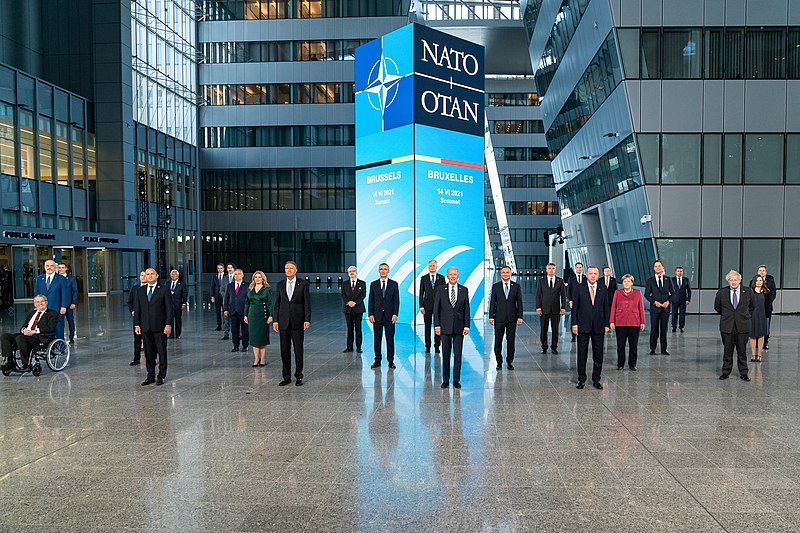Tensions remain between Russia and Ukraine with the possibility of turning into an all-out military conflict. In an effort to negotiate with the West, Moscow has demanded that NATO stop its military activities in Eastern Europe.
Reuters reports that Moscow is demanding that NATO guarantee that it will stop its military activities in Eastern Europe as well as Ukraine. This is part of the security demands that Russia looks to negotiate with the West. Moscow detailed its demands for the first time that it claims are important in order to diffuse tensions in Europe and the conflict in Ukraine.
This comes as western nations are accusing Russia of looking to carry out a possible invasion of Ukraine after the buildup of its troops at the border the two countries share. Another demand that Russia is asking from NATO is to have veto authority over allowing Ukraine to join the alliance. The West has already ruled this request out.
Other demands suggest the removal of US nuclear weapons from Europe and the withdrawal of NATO forces from Poland, Estonia, Latvia, and Lithuania.
A senior US official said that the US was prepared to discuss the demands. However, they noted that there are demands that even Russia knows are “unacceptable.” They added that Washington will respond in the coming days with more concrete proposals regarding any discussions over the demands.
“We will not compromise the key principles on which European security is built, including that all countries have the right to decide their own future and foreign policy, free from outside interference,” said White House Press Secretary Jen Psaki.
NATO officials also told the outlet that Russia cannot have veto power on any potential expansion and that the alliance has the right to decide its own military stance.
In other related news, Ukrainian soldier and activist Kateryna Koval told Express that Russia’s waging of information and propaganda wars within Ukraine are as dangerous as an invasion. Koval explained how the Kremlin’s highly effective “information policy” made up of digital bots and trolls were able to shape anti-Ukraine policy within the country, including in the annexed Crimea and the Donbas region.
Koval explained how these digital bots and trolls have carried out what she described as the “first stage of invasion” of her country.
“They have armies of trolls and bots in social networks like Twitter, like Facebook, like Instagram,” said Koval. “And they use lots of messages concerning war, lots of messages concerning that NATO is the challenge for Russia.”



 Argentina Tax Reform 2026: President Javier Milei Pushes Lower Taxes and Structural Changes
Argentina Tax Reform 2026: President Javier Milei Pushes Lower Taxes and Structural Changes  Israel Launches Fresh Strikes on Iran After Death of Supreme Leader Ayatollah Khamenei
Israel Launches Fresh Strikes on Iran After Death of Supreme Leader Ayatollah Khamenei  Trump to Address Nation as U.S. Launches Strikes in Iran, Axios Reports
Trump to Address Nation as U.S. Launches Strikes in Iran, Axios Reports  Netanyahu Suggests Iran’s Supreme Leader Khamenei May Have Been Killed in Israeli-U.S. Strikes
Netanyahu Suggests Iran’s Supreme Leader Khamenei May Have Been Killed in Israeli-U.S. Strikes  Trump Says U.S. Combat Operations in Iran Will Continue Until Objectives Are Met
Trump Says U.S. Combat Operations in Iran Will Continue Until Objectives Are Met  Macron Urges Emergency UN Security Council Meeting as US-Israel Strikes on Iran Escalate Middle East Tensions
Macron Urges Emergency UN Security Council Meeting as US-Israel Strikes on Iran Escalate Middle East Tensions  Russia Signals Openness to U.S. Security Guarantees for Ukraine at Geneva Peace Talks
Russia Signals Openness to U.S. Security Guarantees for Ukraine at Geneva Peace Talks  EU Urges Maximum Restraint in Iran Conflict Amid Fears of Regional Escalation and Oil Supply Disruption
EU Urges Maximum Restraint in Iran Conflict Amid Fears of Regional Escalation and Oil Supply Disruption  Australia Rules Out Military Involvement in Iran Conflict as Middle East Tensions Escalate
Australia Rules Out Military Involvement in Iran Conflict as Middle East Tensions Escalate  Middle East Conflict Escalates After Khamenei’s Death as U.S., Israel and Iran Exchange Strikes
Middle East Conflict Escalates After Khamenei’s Death as U.S., Israel and Iran Exchange Strikes  Failure of US-Iran talks was all-too predictable – but Trump could still have stuck with diplomacy over strikes
Failure of US-Iran talks was all-too predictable – but Trump could still have stuck with diplomacy over strikes  U.S. Deploys Tomahawks, B-2 Bombers, F-35 Jets and AI Tools in Operation Epic Fury Against Iran
U.S. Deploys Tomahawks, B-2 Bombers, F-35 Jets and AI Tools in Operation Epic Fury Against Iran  Pentagon Leaders Monitor U.S. Iran Operation from Mar-a-Lago
Pentagon Leaders Monitor U.S. Iran Operation from Mar-a-Lago  Israel Strikes Hezbollah Targets in Lebanon After Missile and Drone Attacks
Israel Strikes Hezbollah Targets in Lebanon After Missile and Drone Attacks  Marco Rubio to Brief Congress After U.S.-Israeli Strikes on Iran
Marco Rubio to Brief Congress After U.S.-Israeli Strikes on Iran  Trump Warns Iran as Gulf Conflict Disrupts Oil Markets and Global Trade
Trump Warns Iran as Gulf Conflict Disrupts Oil Markets and Global Trade  Zelenskiy Urges Change in Iran After U.S. and Israeli Strikes, Cites Drone Support for Russia
Zelenskiy Urges Change in Iran After U.S. and Israeli Strikes, Cites Drone Support for Russia 































